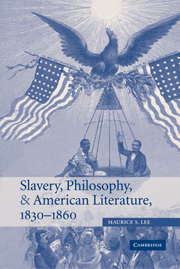Book contents
- Frontmatter
- Contents
- Acknowledgments
- Introduction
- 1 Absolute Poe
- 2 “Lord, it's so hard to be good”: affect and agency in Stowe
- 3 Taking care of the philosophy: Douglass's commonsense
- 4 Melville and the state of war
- 5 Toward a transcendental politics: Emerson's second thoughts
- Epilogue: An unfinished and not unhappy ending
- Index
2 - “Lord, it's so hard to be good”: affect and agency in Stowe
Published online by Cambridge University Press: 22 September 2009
- Frontmatter
- Contents
- Acknowledgments
- Introduction
- 1 Absolute Poe
- 2 “Lord, it's so hard to be good”: affect and agency in Stowe
- 3 Taking care of the philosophy: Douglass's commonsense
- 4 Melville and the state of war
- 5 Toward a transcendental politics: Emerson's second thoughts
- Epilogue: An unfinished and not unhappy ending
- Index
Summary
Thinkers sometimes champion beliefs that they themselves cannot confidently hold. Intellectual projects are sometimes driven, not by conviction, but rather the desire for conviction. The dogged search for definite knowledge becomes especially compelling when the shortcomings of a philosophical system form a kind of fortunate flaw. Barred from the paradise of coherence and unable to verify truth-claims, theories that struggle against their own limitations point to both the fall of rational authority and the hope for redemption, for order. As we have seen, Poe cannot or will not reconcile his urge for a unified transcendental design with the political leveling it implies. Indeed, Poe's narratives of slavery and race rely on this disjunction, which Poe sometimes bemoans but more often exploits with a sensational and transfixed glee. Like Poe, Stowe is unable to ignore the incongruities of her philosophy. But while Poe revels in his collapsing systems, the more constructive, more perfectionist Stowe tries harder to salvage her logic. Stowe, that is, oftentimes appears as a writer utterly convinced of her rightness, yet she remains profoundly self-critical in her self-contradictions. Her precarious poise makes her an especially insightful theorist of affect precisely because she does not back away from the problems inherent to her thought. These problems involve both the accuracy and agency of sympathy, both the challenge of determining moral truth and of enacting that truth in the world.
- Type
- Chapter
- Information
- Slavery, Philosophy, and American Literature, 1830–1860 , pp. 52 - 92Publisher: Cambridge University PressPrint publication year: 2005



